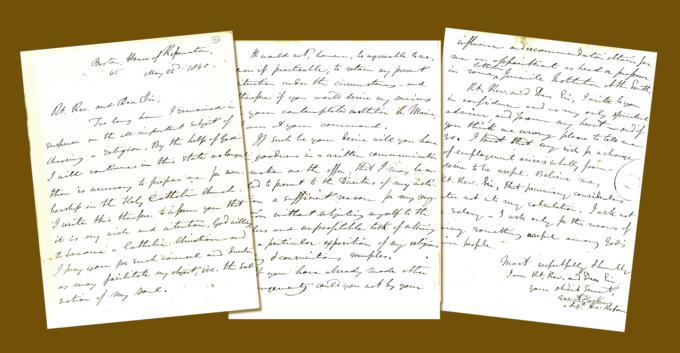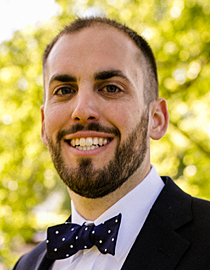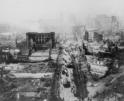
Culture
"Believe me, Rt. Rev. Sir, that pecuniary considerations enter not into my calculation. I ask not for salary -- I ask only for the means of doing something useful among God; our people."

Lester
On May 22, 1840, Protestant Episcopal Minister George Foxcroft Haskins wrote Bishop Benedict J. Fenwick from the Boston House of Reformation, revealing his decision to convert to the Catholic faith.
Haskins was born in Boston on April 4, 1806, to parents Thomas and Elizabeth. After attending Boston Latin School, he entered Harvard College, graduating in 1826, and commenced theological studies with the intention of becoming a Protestant Episcopal minister.
One of his early assignments was as lay preacher of a church in Leicester, Massachusetts. On Feb. 8, 1829, was ordained a deacon. That same year, he was made chaplain of the House of Industry in South Boston, which, while short-lived, was significant as he became acquainted with Father William Wiley, a Catholic priest who had converted to Catholicism in 1820.
The following year, 1830, Haskins was named rector of Grace Church in Boston, and subsequently ordained a full minister on Dec. 9, 1830. In 1831, he was reassigned to Grace Church in Providence, Rhode Island, where growing doubts about his faith saw him seek the counsel of Father Wiley.
A biography of Haskins published in 1899 identifies several influences that contributed to his eventual conversion. The first were conversations with Father Wiley. The text also provides several anecdotes where he witnessed the strength in faith of Irish Catholic Bostonians, which inspired him. And, finally, while studying theology, he attended lectures delivered by Dr. Lyman Beecher containing anti-Catholic rhetoric. They were said to have struck him as particularly harsh and caused him to attend a rebuttal given by Bishop Fenwick and Father Thomas O'Flaherty so as to give the opposition view fair consideration.
Haskins resigned his position in Providence in 1832. Returning to Boston, he served as chaplain of the House of Reformation until 1836, and afterward Overseer of the Poor and a teacher. It is said he used these years to research and reflect upon his faith.
His May 1840 letter informs Bishop Fenwick of his decision to convert, writing "it is my wish and intention, God willing, to become a Catholic Christian, and I pray you for such counsel and direction as may facilitate my object, viz. the salvation of my soul."
He expresses his wish to be useful in service to the Catholic Church once his conversion takes place and offers a few suggestions. The first was to be assigned to the "contemplated institution in Maine," referring to the seminary the bishop hoped to establish at his Catholic settlement in Benedicta. If desired, he asks for an offer in writing so he can resign from his current occupation without having to explain himself. Alternatively, he asks the bishop to find him, "an appointment as head or professor in some Catholic juvenile institution of the South," a reasonable request giving his experience in houses of reform and as a teacher.
Haskins concludes that he writes in confidence, from his heart and, if the bishop believes him misguided, that he would say as much. He suggests a change of employment only so that he may be useful, writing, "Believe me, Rt. Rev. Sir, that pecuniary considerations enter not into my calculation. I ask not for salary -- I ask only for the means of doing something useful among God; our people."
Haskins converted to the Catholic faith at the Cathedral of the Holy Cross in November 1840. After a short visit with Father Wiley, he prepared for a journey to Rome so he could explore his new faith, and eventually decided to enter the Sulpician Seminary at Paris in preparation for becoming a Catholic priest.
The next installment of this column will discuss Father Haskins' work in Boston, where he was ordained in 1844 upon his return from Europe.
- Father Thomas Ryan, CSP, directs the Paulist North American Office for Ecumenical and Interfaith Relations in Boston.
Recent articles in the Culture & Events section
-
Boston and the nation respond to the San Francisco Earthquake of 1906Thomas Lester
-
See you in the storyLaura Kelly Fanucci
-
'Dignitas' and the mediaRussell Shaw
-
Scripture Reflection for April 14, 2024, Third Sunday of EasterDeacon Greg Kandra
-
St. Helena's House is established in the South EndThomas Lester


















